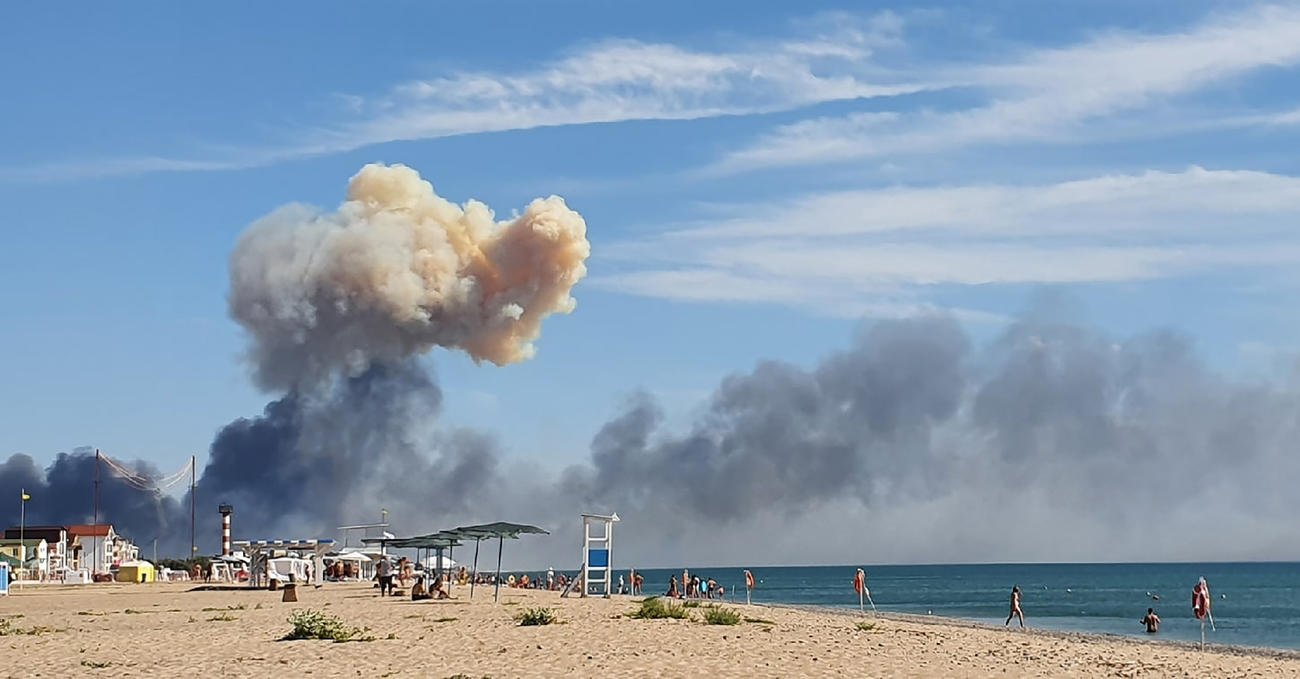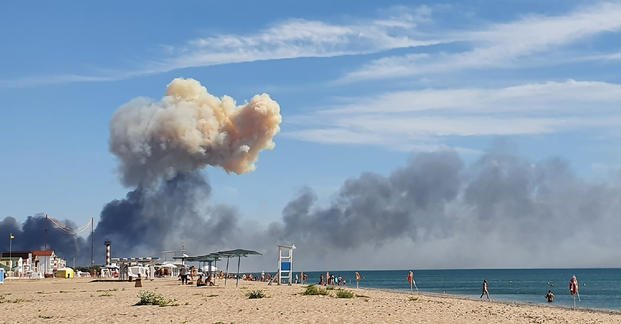

KYIV, Ukraine — Ukraine’s air force said Wednesday that nine Russian warplanes were destroyed in massive explosions at an air base in Crimea amid speculation they were the result of a Ukrainian attack that would represent a significant escalation in the war.
Russia denied any aircraft were damaged in Tuesday’s blasts — or that any attack took place.
Ukrainian officials have stopped short of publicly claiming responsibility for the explosions, while poking fun at Russia’s explanation that a careless smoker might have caused munitions at the Saki air base to catch fire and blow up. Analysts have also said that explanation doesn’t make sense and that the Ukrainians could have used anti-ship missiles to strike the base.
While dodging credit, several Ukrainian officials have pointedly underscored the importance of the peninsula, which Moscow annexed eight years ago.
Crimea holds huge strategic and symbolic significance for both Ukraine and Russia — further emphasized by how both danced around what actually happened. The Kremlin’s demand that Ukraine recognize Crimea as part of Russia has been one of its key conditions for ending the hostilities, but Ukraine has vowed to drive the Russians from the peninsula and all other occupied territories.
Hours after the blast, Ukrainian President Volodymyr Zelenskyy promised again to do just that.
“This Russian war against Ukraine and against all of free Europe began with Crimea and must end with Crimea — its liberation,” he said in his nightly address.
The explosions, which killed one person and wounded 14, sent tourists fleeing in panic as plumes of smoke towered over the nearby coastline. Video showed shattered windows and holes in the brick work of some buildings.
Crimea’s regional leader, Sergei Aksyonov, said some 250 residents were moved to temporary housing after dozens of apartment buildings were damaged.
But Russian authorities sought to downplay the explosions on Wednesday, saying all hotels and beaches were unaffected on the peninsula, which is a popular tourist destination for many Russians.
President Vladimir Putin has long insisted Crimea is Russian and warned that any attempts to take it back would trigger massive retaliation. Moscow’s apparent swallowing of the strike showed Putin’s weakness, said Ukrainian military analyst Oleh Zhdanov.
“He’s expected to protect Crimea as Russia proper,” said Zhdanov. “Now he’s afraid to recognize that it was done by the Ukrainian armed forces.”
Russian warplanes have used Saki to strike areas in Ukraine’s south, and social networks were abuzz with speculation that Kyiv fired missiles at the base.
A Ukrainian presidential adviser, Oleksiy Arestovych, who is more outspoken than other officials, cryptically said Tuesday that the blasts were caused either by a Ukrainian-made long-range weapon or were the work of guerrillas operating in Crimea.
The base on the Black Sea peninsula, which dangles off southern Ukraine, is at least 200 kilometers (some 125 miles) away from the closest Ukrainian position — out of the range of the missiles supplied by the U.S. for use in the HIMARS systems.
The Ukrainian military has successfully used those missiles, with a range of 80 kilometers (50 miles), to target ammunition and fuel depots, strategic bridges and other key targets in Russia-occupied territories.
HIMARS could also fire longer-range rockets, with a range of up to 300 kilometers (about 185 miles) — and Ukraine has repeatedly pleaded for such weapons.
U.S. authorities have refrained from providing them thus far, fearing that it could provoke Russia and widen the conflict. The explosions raised speculation on social media that Ukraine might have finally got the weapons.
But Zhdanov, the analyst, suggested the Ukrainian forces could have struck the Russian air base with a Ukrainian Neptune anti-ship missile that has a range of about 200 kilometers (about 125 miles) and could have been adapted for use against ground targets.
The Ukrainian military also might have used Western-supplied Harpoon anti-ship missiles that have a range of about 300 kilometers (about 185 miles), he said.
“Official Kyiv has kept mum about it, but unofficially the military acknowledges that it was a Ukrainian strike,” Zhdanov said.
The Washington-based Institute for the Study of War said it couldn’t independently assess what caused the explosions, but noted that simultaneous explosions in two places at the base likely ruled out an accidental fire — but not the possibility of sabotage or a missile attack.
But, it added, “the Kremlin has little incentive to accuse Ukraine of conducting strikes that caused the damage since such strikes would demonstrate the ineffectiveness of Russian air defense systems.”
If the Ukrainian forces were, in fact, responsible for the blasts, it would be the first known major attack on a Russian military site in Crimea. A smaller explosion last month at the headquarters of Russia’s Black Sea Fleet in the Crimean port of Sevastopol was blamed on Ukrainian saboteurs using a makeshift drone.
During the war, Russia has reported numerous fires and explosions at munitions storage sites on its territory near the Ukrainian border, blaming some of them on Ukrainian strikes. Ukrainian authorities have mostly remained silent about the incidents.
Meanwhile, Russian shelling hit areas across Ukraine on Tuesday night into Wednesday, including the central region of Dnipropetrovsk, where 13 people were killed and 11 others were wounded, according to the region’s governor, Valentyn Reznichenko.
Reznichenko said the Russian forces fired at the city of Marganets and a nearby village. Dozens of residential buildings, two schools and several administrative buildings were damaged by the shelling.
“It was a terrible night,” Reznichenko said. “It’s very hard to take bodies from under debris. We are facing a cruel enemy who engage in daily terror against our cities and villages.”
The Russian forces also continued shelling the nearby city of Nikopol across the Dnieper River from the Russia-occupied Zaporizhzhia nuclear power plant, Europe’s largest.
Ukraine and Russia have accused each other of shelling the power station, stoking international fears of a catastrophe.
On Wednesday, foreign ministers of the Group of Seven leading industrialized democracies demanded that Russia immediately hand back full control of the plant to Ukraine.
“We remain profoundly concerned by the serious threat that the seizure of Ukrainian nuclear facilities and other actions by Russian armed forces pose to the safety and security of these facilities, significantly raising the risk of a nuclear accident or incident and endangering the population of Ukraine, neighboring states and the international community,” they said in a statement.
© Copyright 2022 Associated Press. All rights reserved. This material may not be published, broadcast, rewritten or redistributed.
